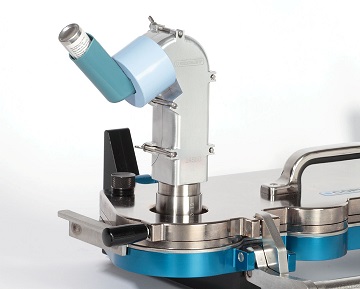Copley Scientific Showcases New Products for Smarter Inhaled Product Testing at DDL 24

New products for smarter, more representative inhaled product testing will be on display at the Copley Scientific stand at Drug Delivery to the Lungs 24 (DDL 24, 11–13 December 2013, Edinburgh International Conference Centre, Scotland).
The latest additions to the Copley Scientific range help to make inhaled testing more efficient and improve the in vivo relevance of in vitro test methods. Centre stage will be the new Child Alberta Idealised Throat which is used to gather test data that is of direct relevance to paediatric patients.
All orally inhaled products (OIPs) are characterised in terms of aerodynamic particle size distribution to infer information about where in the lung they may deposit. The highly successful Alberta Idealised Throat (AIT) was developed as an alternative to the standard USP induction port, which is used to interface the product with the test equipment during this measurement process. With a standardised, highly reproducible, human-like geometry, the AIT has been shown to more accurately simulate the deposition of OIPs in the upper respiratory tract, relative to the USP induction port, making testing more representative of in vivo behaviour. The new Child Alberta Throat is based on child and infant throat geometry, and extends this facility for more representative testing to those developing products for paediatric patient groups.
Also on display will be the new TPK-R critical flow controller, the BAC 2000, breath actuation controller and a new breathing simulator model, the BRS 1100. A reverse version of the TPK critical flow controller the TPK-R has recently been launched to improve the ergonomics of test set-up for dry powder inhaler (DPI) testing. The BAC 2000 allows for the testing of breath actuated MDIs and together with the BRS 1100, simplify nebuliser testing in accordance with the latest regulatory guidance. In combination, they also provide an efficient solution for characterising MDIs with spacers and valved holding chambers, in line with the strategy outlined in a recently published USP stimuli to the revision process.
Related News
-
News Pharmapack Awards 2024 Patient-Centric Design Award Winner – Dr Ferrer BioPharma
The 2024 Pharmapack Awards celebrated the best in innovation and design for the pharmaceutical packaging and drug delivery industry on January 24, 2024. -
News Women in Pharma: Minding the Gap at Pharmapack 2024
2024 marks the first year Pharmapack will host a Diversity track dedicated to bridging the gap within the pharmaceutical packaging and drug delivery sector. The track includes a panel discussion on 'Enabling Diversity in the Workplace,' focused... -
News Pharmapack Awards 2024 - Celebrating Packaging and Drug Delivery Innovation
The 2024 Pharmapack Innovation Awards ceremony celebrated the best in pharmaceutical packaging and drug delivery innovation at all levels. The awards were held on January 24, 2024 at the Paris Expo Porte de Versailles. -
News Pharmapack 2024 - From the Floor
Paris once again welcomes Europe’s leading trade show in pharmaceutical packaging and drug delivery innovation. Join our content team as Pharmapack 2024 opens its doors to leading experts and innovators in pharmaceutical packaging and drug delive... -
News CPHI Barcelona 2023: Partnering for Success – Managing Outsourcing Relationships to Optimise Manufacturing Operations
During CPHI Barcelona 2023, insightful content sessions offered attendees the chance to explore trending topics with expert speakers and panellists. Here, we summarise what the pharma industry and supply chain are talking about the most. -
News CPHI Barcelona 2023: Loading Potential – Artificial Intelligence for Pharma Manufacturing
During CPHI Barcelona 2023, insightful content sessions offered attendees the chance to explore trending topics with expert speakers and panellists. Here, we summarise what the pharma industry and supply chain are talking about the most. -
News Pharmaceutical industry supports COP28 health stance in joint statement
As COP28 takes place over this week in Dubai, UAE, several bodies in the pharmaceutical and health industries have come together to announce support of key movements in sustainability in the sector, and to recognise sustainability as a health issue.&nb... -
News CPHI Podcast Series: Start-ups take centre stage at CPHI Barcelona
The first episode of the CPHI Podcast Series since we attended CPHI Barcelona in October covers the Start-up market at the event, with expert Matthew Wise joining Editor Lucy Chard to discuss the event.
Position your company at the heart of the global Pharma industry with a CPHI Online membership
-
Your products and solutions visible to thousands of visitors within the largest Pharma marketplace
-
Generate high-quality, engaged leads for your business, all year round
-
Promote your business as the industry’s thought-leader by hosting your reports, brochures and videos within your profile
-
Your company’s profile boosted at all participating CPHI events
-
An easy-to-use platform with a detailed dashboard showing your leads and performance





.png)

